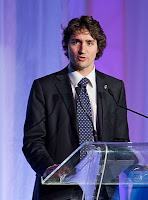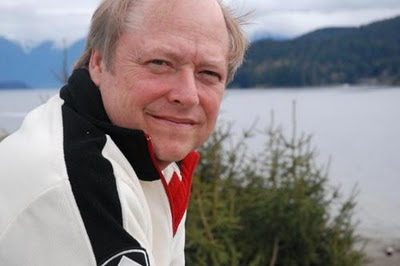 Her Excellency the Right Honourable Michaëlle Jean, Governor General of Canada, celebrated Canadian citizenship as she swore in 48 new citizens from across Canada—31 adults and 17 children—during a special public ceremony held at Rideau Hall to mark the 60th anniversary of Canadian citizenship. July 1, 2007.
Her Excellency the Right Honourable Michaëlle Jean, Governor General of Canada, celebrated Canadian citizenship as she swore in 48 new citizens from across Canada—31 adults and 17 children—during a special public ceremony held at Rideau Hall to mark the 60th anniversary of Canadian citizenship. July 1, 2007.By Melynda Jarratt and Don Chapman
It's Citizenship week and all across Canada the federal government is rolling out the red carpet for new Canadians at ceremonies designed to engage them in the concept of "citizenship": but not everyone is celebrating.
In every province and territory there are untold numbers of "Lost Canadians" who have been stripped of their citizenship by outdated provisions of the 1947 Citizenship Act that discriminate on the basis of gender and marital status.
It's hard to believe that in 2010, Citizenship and Immigration Canada (CIC) can take away your citizenship or reject your application on the basis of your gender or whether you were born in or out of wedlock.
Such discrimination is, after all, a violation of Section 15 of the Charter of Rights and Freedoms, two Supreme Court rulings on citizenship (Benner 1997 and Augier 2004), the Legitimation Act of 1927 and a host of United Nations Human Rights Conventions that are designed to prevent statelessness including the Convention on the Rights of the child.
Unfortunately, the discrimination is happening every day and the very real people in this story are proof that it's true: they run the gamut from children of Canadian War Brides who have lived in Canada their entire lives and whose sole crime was to have been born out of wedlock, to the foreign born children of Canadian women who cannot pass on citizenship because they are female. In contrast, foreign born children of Canadian men can inherit their father's citizenship.
Still other find themselves in Lost Canadian limboland because of a confusing, kafquesque system that is incapable of dealing with applications for citizenship in a humane and eficient manner. These situations are perhaps, the most frustrating, because at least with the blatant gender and marital status discrimination inherent in the 1947 Act, some Lost Canadians know the reason why they are being stripped of their citizenship.
But for many, there isn't even a reason why - other than what seems to be the glaring ineptitude of CIC employees who do not know their own legislation, who treat applicants differently across the country, granting citizenship to some while denying it to others, and whose Minister Jason Kenney, has failed to lead by resolving the issue of Lost Canadians once and for all.
Ian Munroe of Chester Basin, Nova Scotia is a perfect example of someone who should be a Canadian, but he isn't. That's because the 65 year old Scottish-born son of a Canadian War Bride and a Canadian World War Two veteran can't seem to convince anyone at Citizenship and Immigration Canada (CIC) that he's entitled to citizenship. Why? Nobody seems to know.
It doesn't matter that Ian arrived at Halifax's Pier 21 as an infant with his war bride mother on the Queen Mary in June 1946 and that he lived here his entire life, went to school, married, raised a family and even served his country for nearly 20 years in the Canadian navy.
As far as CIC is concerned, Ian Munroe is not a Canadian citizen and after years of frustration, Ian finally gave up. The last straw was when his best friend died in the United states: Ian couldn't risk attending the funeral because he couldn't get a passport due to his citizenship problems. Last year, Ian applied for and received his British passport with little fuss. "I gave up", he said.
In New Brunswick, 94 year old Theresa Kenney likely won't be celebrating Citizenship Week either: born in Mirimachi in 1911, the former Roman Catholic nun and retired school teacher moved back to Canada six years ago after spending most of her life in the United States.
Theresa was 13 years old when her father died in Miramichi and her mother moved the family to Boston. In 1977 Theresa took out American citizenship, a move that has complicated matters because according to the old Citizenship Act, Canadians could not have dual nationality - although they can now.
Theresa's greatest wish is to die a Canadian citizen and be buried next to her father at St. Michael's Cemetery in Miramichi, but it could take years and Theresa doesn't have many of those left.
Some readers might say "Well, that's her own fault, she lived in the United States for seventy years and took out American citizenship." That may be so, but compare Theresa's treatment to Jack Babcock, Canada's last surviving World War One veteran who died last year in the United States where he had lived since the end of the First World War. At the very least, Theresa should get equal treatment.
Jack Babcock was born on July 23, 1900 in Frontenac County, Ontario. After serving in the Canadian army overseas during the First World War he moved to the US in 1919 and joined the American Army, working as an electrician. In 1946 he took out American citizenship and never looked back. In May 2007, with the death of Dwight Wilson, Jack Babcock became the last surviving World War One veteran born in Canada. Naturally, the Canadian government was concerned about the contradiction of having an American citizen as its last surviving WWI veteran so it quickly moved to grant Jack Babcock Canadian citizenship. In what only can be described as a whirlwind application, Jack had his citizenship in 21 days, hand delivered to his home in Seattle, Washington by then Minister of Veterans Affairs Greg Thompson.
Meanwhile, in Quebec, the family of another Canadian veteran, Quebec born Guy Vallieres won't be marking Citizenship Week either. They're still mourning his death last year at age 84 as a foreigner in his own country. Guy served in the Canadian Army during World War Two, lived and worked in Quebec after the war. He made the mistake of moving to the United States in 1969. He worked there for ten years and retired, collecting his Canada Pension, Quebec Pension and a pension from Canadian National Railways. But when he tried to come back in 2006 he was told that he was no longer Canadian. His family struggled for years with CIC to have Guy's citizenship restored but he died in February 2009 before it happened. On his gravestone it says: "You are a man forgotten by your country but acknowledged by the wish to be Canadian."
In Ontario, 67 year old Marion Veermeersch won't be celebrating Citizenship Week. The daughter of a British War Bride and a Canadian veteran, Marion has been told she's not a Canadian because she was born out of wedlock in Britain during the war to a British mother and a Canadian father.
The fact that Marion came to Canada as a baby on the War Bride ship the Queen Mary in June, 1946, has lived in Canada her entire life, worked, paid taxes, raised a family and even voted in elections doesn't matter to the bureaucrats at CIC. What does matter is that her parents weren't married when Marion was born and that the 1947 Citizenship Act allows for marital status discrimination.
Marion's older brother, Peter, also won't be celebrating: the child of his mother's first marriage to a British man, Peter came to Canada as a nine year old with his mother and baby sister Marion. He served more than 35 years in the Canadian Armed Forces and travelled extensively around the world until 9/11, when a simple application for a new passport triggered a re-evaluation of his citizenship status. Turns out Peter's stepfather, Sandy Barr was himself a British Home Child who was brought to Canada to work as a farm labourer in the 1920s. Sandy never thought to formally adopt Peter so as far as CIC is concerned, Peter is British, not Canadian.
Jackie Scott was born out of wedlock to a British War Bride and a Canadian servicemen overseas during the Second World War. After the war, she and her mother came to Canada and her parents married. Jackie grew up in Canada, went to school, married and had her first daughter here. In the 1970s, her husband found work in the US and they moved to California. When Jackie tried to come back to Canada she was told she had never been a Canadian because she was born out of wedlock.
And so it goes on, all across Canada, there are hundreds of Ian Munroes, Theresa Kenneys, Guy Vallieres, Marion Vermeersches, Peter Brammahs and Jackie Scotts who have been trying unsuccessfully for years, to be recognized as Canadian citizens. They've filled out their forms, paid their fees, gathered up all their documents - the decades old birth certificates, marriage certificates, proof of landings, War Bride passenger lists, even old passports and citizenship cards that CIC now says were given in error. But it's all to no avail because the Minister of Citizenship, Jason Kenney, refuses to listen.
If the Lost Canadians and their supporters sound somewhat cynical, please forgive them when they heave a sigh at news that a baby born to one of the 492 Sri Lankan refugees who landed in British Columbia on the Sun Sea in August is automatically a Canadian citizen, or that the adopted Haitian refugee children who were brought to Canada in a hurry after the January earthquake became Canadian citizens in six weeks.
It's one thing to grant immigrants, refugees and adopted children citizenship, but when a person who is actually born in Canada can lose their citizenship, there is something wrong with the system.
And when a person whose who grew up here, lived, worked, paid taxes and raised a family in Canada, - even served in the military- can lose their citizenship it is time for some serious reflection on a system that has gone awry.
All the Lost Canadians want is to be treated equally - no less, no more - and for the Minister of Citizenship Jason Kenney to give them a reason to start celebrating Citizenship Week by giving them back the citizenship they so richly deserve.
 In April 2009, thousands of people around the globe awoke one morning with the right to claim Canadian citizenship. This right was not theirs the previous day, but remains theirs today.
In April 2009, thousands of people around the globe awoke one morning with the right to claim Canadian citizenship. This right was not theirs the previous day, but remains theirs today.









 From the blog
From the blog 
